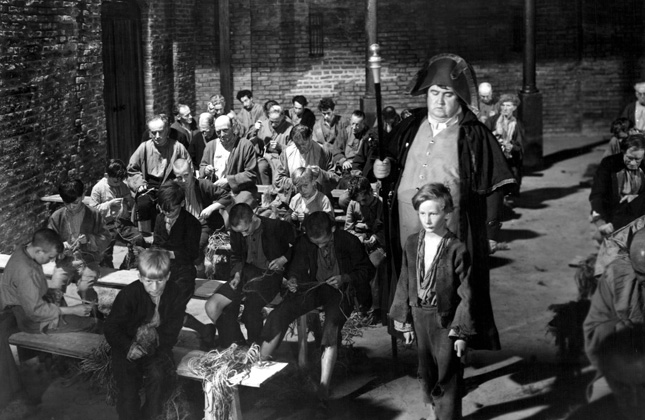



What overwhelms you about David Lean’s second most famous Dickens adaptation is the sense of hunger that washes off the screen and erases any sense of “period piece” about it.
“Oliver Twist” makes hunger so timeless that the 19th century poverty it is part and parcel of becomes secondary. The stunning production design, the peerless cinematography of Guy Green, the poignancy of the story and the tragedy at the heart of it recede every moment a hungry child devours whatever crumbs a cruel society cares to give it.
It’s a 72 year-old black and white film of a novel by literature’s great sentimentalist, with accents so thick you wish it had subtitles at times. And it will break your heart.
I can’t remember catching this back when I first dove into David Lean via my grad school advisor, a Lean scholar who parked the master’s “Great Expectations” adaptation and other Lean films in the college’s film society every chance he got.
“Great Expectations” (1946) is the more celebrated film. And many Dickens titles have been filmed repeatedly, adapted into modern settings even, so none of his stories are capable of surprising the viewer, although Armando Ianucci’s “David Copperfield” and the giddy big screen “Nicholas Nickleby” of some years back came close.
But “Oliver Twist” is the first classic I’ve dipped into in ages that had my jaw agape and “Wow” coming out of my mouth more times than I can count.
There was a David Lean documentary some years back in which the veteran editor scoffed at the average moviegoer’s (and critic’s) oohing and ahhing over “that lovely shot.” “It’s the cutting,” he’d insist, the editing people like he did that made that masterful camel rider approaching out of a mirage in “Lawrence of Arabia” glorious.
Perhaps. But the crowded, dark and dingy London set designer John Bryan puts us in is total immersion, a Charles Dickens theme park of want, cruelty and shadows. I can’t imagine producers of the 1960s stage and screen musical “Oliver!” ever bothered to read the book. This “Oliver Twist” was all the research they needed.
A very pregnant woman (Josephine Stuart) staggers and groans her way through a dark night to a town workhouse, where she gives birth, comforts her infant for a moment, and dies.
The boy (John Howard Davies) may seem quiet and compliant as he passes through his early years at this orphanage/slave labor institution. But when The Beadle (Francis L. Sullivan) places him at an undertaker’s establishment, the kid shows his mettle. He won’t be bullied, won’t hear ill of his late mother.
And when he gets his chance, he flees to London. That’s where The Artful Dodger (future Brit crooner Anthony Newley) marks him, and that’s how he’s brought into the pickpocket mob run by Fagin.
Alec Guinness is almost unrecognizable in the makeup and hatchet-sized beak of this Victorian caricature. His Fagin was why the film was kept from release in the U.S., Jewish groups regarding the hideous stereotype that portrayal represents. He was edited almost entirely out of the picture when it opened here in 1951.
You can say the anti-Semitism is Dickens’ own, a British failing that was still on public display during Monty Python’s glory years. But Fagin is a wholly realized villain, memorable with or without historically slanderous Jewish associations.
“You’d like to make pocket handkerchiefs as easily as the Artful Dodger, wouldn’t you my dear?” Guinness purrs, turning Fagin’s catch-phrase, “My dear,” menacing when cajoling won’t do.
Robert Newton’s Bill Sikes is less horrific than later Sikes, perhaps because productions like Roman Polanski’s wanted to play up Bill and soften Fagin.
Through it all, young Master Davies (only nine when the film premiered), and underplays the hero in keeping with the spirit of the novel. Oliver is a reflection of the times, an underclass deserving better. Surrounding him with colorful character actors with those funny lines and outlandish Dickensian aptronym-names all but puts him in the background.
Grumpy cynic Mr. Grimwig (Frederick Lloyd) is just one minor character who has punchier lines than young Oliver.
“You old women never believe anything but quack doctors and lying story books.”
But what we remember from this tale, filmed refilmed and turned into a musical, beautifully rendered in one of the loveliest black and white films ever here, is a hungry child and the shame of those callous enough to let that happen, a little boy asking the one unforgivable request during one malnourished meal.
“Please sir, can I have some more?”

MPAA Rating: “approved”
Cast: John Howard Davies, Robert Newton, Alec Guinness, Kat Walsh, Francis L. Sullivan and Anthony Newley
Credits: Written and directed by David Lean adapted from the novel by Charles Dickens.
Running time:
